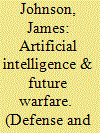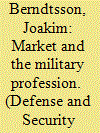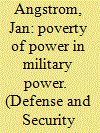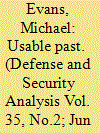| Srl | Item |
| 1 |
ID:
165361


|
|
|
|
|
| Summary/Abstract |
Recent developments in artificial intelligence (AI) suggest that this emerging technology will have a deterministic and potentially transformative influence on military power, strategic competition, and world politics more broadly. After the initial surge of broad speculation in the literature related to AI this article provides some much needed specificity to the debate. It argues that left unchecked the uncertainties and vulnerabilities created by the rapid proliferation and diffusion of AI could become a major potential source of instability and great power strategic rivalry. The article identifies several AI-related innovations and technological developments that will likely have genuine consequences for military applications from a tactical battlefield perspective to the strategic level.
|
|
|
|
|
|
|
|
|
|
|
|
|
|
|
|
| 2 |
ID:
165359


|
|
|
|
|
| Summary/Abstract |
This article discusses roles and missions of the United States Navy with a particular focus on the Baltic Sea. That particular sea has gained renewed political and military attention following Russia's resurgent and increasingly hybrid-offensive foreign policy. Baltic nations, uncertain of what the future holds, ought to look at sea power and maritime missions in the Baltic, as well as US naval presence in Europe, to draw lessons for future posture.
|
|
|
|
|
|
|
|
|
|
|
|
|
|
|
|
| 3 |
ID:
165363


|
|
|
|
|
| Summary/Abstract |
The rise of private military and security companies (PMSCs) challenges our notion of military professionals. PMSCs bring new claims to professional status and legitimacy outside military institutions and represent an increasing diffusion of - and competition over - military and security expertise. In light of this development, understanding the formation of professional identities in military and private security organisations is as an important undertaking. This paper contributes to this endeavour by analysing professional self-images in the Swedish Armed Forces and how these relate to PMSCs. The study is based on data collected from official documents, semi-structured interviews and a small-scale survey among senior military officers. Focusing on military understandings of PMSCs and contractors, the analysis provides much-needed insight into relational aspects of professional identity formation outside the US context. Furthermore, it points to discrepancies in organisational and group levels in understandings of commercial security actors, and paves the way for future research.
|
|
|
|
|
|
|
|
|
|
|
|
|
|
|
|
| 4 |
ID:
165362


|
|
|
|
|
| Summary/Abstract |
Strategic studies deals intimately with the topic of power. Most scholars in the discipline work with a concept of power as an adversarial zero-sum competition. This is natural and necessary. However, other conceptions of power developed within political science and sociology could enrich strategic studies. Approaching two typical, traditional tasks of strategy – alliance building and war-fighting – this article demonstrates the heuristic mileage of theories of collective power. In particular, we can shed new light on the post-Cold War transformation of NATO as well as state-building as a strategy in counter-insurgencies with new ideas of power. Broadening the palette of theories of power is thus valuable if strategic studies is to prosper as an independent field of study.
|
|
|
|
|
|
|
|
|
|
|
|
|
|
|
|
| 5 |
ID:
165364


|
|
|
|
|
| Summary/Abstract |
To engage properly with the Somali National Army, to understand it in the hope of improving stability and the lives of over 12 million Somalis, good basic information on its composition and characteristics is necessary. Authoritative accounts on the subject have been scarce for over 25 years. This account seeks to detail the army’s dispositions across southern Somalia, and, more importantly, the brigades’ clan compositions and linkages. Clan ties supersede loyalties to the central government. The army as it stands is a collection of former militias which suffer from ill-discipline and commit crime along with greater atrocities. Estimates of numbers are unreliable, but there might be 13,000 or more fighters in six brigades in the Mogadishu area and five beyond.
|
|
|
|
|
|
|
|
|
|
|
|
|
|
|
|
| 6 |
ID:
165360


|
|
|
|
|
| Summary/Abstract |
The most effective way for the Western profession of arms to use history is to disavow the purism and narrow specialisation of today’s academia in favour of developing a contemporary approach to the subject. The latter aims to foster a range of applied diagnostic skills that transcend the temporal dimensions of past, present, and future. A contemporary approach to history for military professionals emphasises the use of inter-disciplinary war studies to enhance policy relevance. In any defense and security organisation, history must be usable in the sense of providing cognitive and interpretative skills for probing relationships between possibility and actuality, between experience and expectation, and between singularity and repetition. Using history to examine such dialectical interconnections is particularly valuable when military establishments confront their essential task of analyzing emerging trends in the future of war.
|
|
|
|
|
|
|
|
|
|
|
|
|
|
|
|